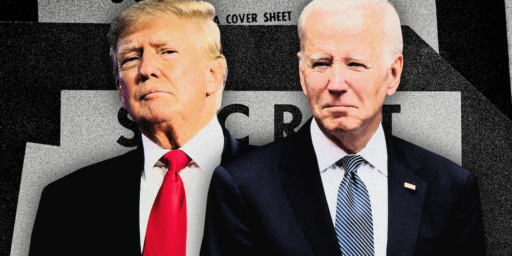White House Refuses Senate Subpoena on NSA Docs
The White House is refusing to turn over classified documents related to the NSA spying program to the Senate.
The Bush administration is rebuffing requests from members of the Senate Judiciary Committee for its classified legal opinions on President Bush’s domestic spying program, setting up a confrontation in advance of a hearing scheduled for next week, administration and Congressional officials said Wednesday. The Justice Department is balking at the request so far, administration officials said, arguing that the legal opinions would add little to the public debate because the administration has already laid out its legal defense at length in several public settings.
But the legality of the program is known to have produced serious concerns within the Justice Department in 2004, at a time when one of the legal opinions was drafted. Democrats say they want to review the internal opinions to assess how legal thinking on the program evolved and whether lawyers in the department saw any concrete limits to the president’s powers in fighting terrorism.
With the committee scheduled to hold the first public hearing on the eavesdropping program on Monday, the Justice Department’s stance could provoke another clash between Congress and the executive branch over access to classified internal documents. The administration has already drawn fire from Democrats in the last week for refusing to release internal documents on Hurricane Katrina as well as material related to the lobbyist Jack Abramoff.
Several Democrats and at least one Republican have pressed the Justice Department in recent days to give them access, even in a closed setting, to the internal documents that formed the legal foundation of the surveillance program. But when asked whether the classified legal opinions would be made available to Congress, a senior Justice Department official said Wednesday, “I don’t think they’re coming out.”
The official said the administration’s legal arguments had already been aired, most prominently in a 42-page “white paper” issued last month. “Everything that’s in those memos was in the white paper,” said the official, who, like other administration and Congressional officials, was granted anonymity because classified material was involved.
The administration’s position here is nonsensical. First, it doesn’t get to decide whether the documents add anything to the debate. Congress has every right to conduct oversight into the operations of the Justice Department and the NSA. Second, if all the information is already in the White Paper, why can’t the documents be turned over?
One would think an executive privilege claim would have more merit. Indeed, there is strong precedent for refusing to turn over internal decision memoranda on that grounds. But, “Nah, you don’t need to see these?”




Second, if all the information is already in the White Paper, why can’t the documents be turned over?
Thank you, JJ. I wondered if that was as ridiculous as it sounded.
I think it’s safe to assume that everything is not in the white paper. I also think the administration has reason to be careful to release classified information that has a good chance of being in the NY Times within a week.
Laura should call Hillary get pointers on how to misplace subpoenaed papers
“Congress has every right to conduct oversight into the operations of the Justice Department and the NSA.”
There are separations of powers on all three branches of government. Congress controls the purse string and past legislation. However, the power to tell the executive branch how and what to do does not exist. They may act like they do most of the time but it doesn’t actually exist in the constitution. Congress does not have the “right “ to all information the executive has. That is the problem with many American today. They tend to mistake privileges for rights.
Wayne,
That’s oversimplifying. Congress controls the purse-strings. That means they have the right (and since it’s partly _my_ tax money they’re blowing, I say they have an _obligation_) to be informed about what that money is being spent on. That’s why “oversight” was invented.
Additionally, since Congress makes the laws, they also have every right to know if the Executive is properly enforcing those laws, even upon themselves.
Finally, Congress _does_ (to a limited extent) have the right to tell the Executive what to do, just as the Judicial branch. That’s what ‘checks and balances’ means – if one branch is able to ignore the other two, then there’s no balance, and we effectively become a dictatorship.
Legion
Congress is being informed on what the money is being spent on, gathering intelligence on enemy of the U.S. If they donÂ’t want to spend money on that then they can cut funding to it. They do not have a right to tell the executive branch how to do its constitutional duty. In reality they do tell the executive branch just that. Not because they have the right but because they can cut the funding. If the executive branch had private funding there would be little the congress by itself could do.
You said “if one branch is able to ignore the other two, then there’s no balance”. The key word is other two. One branch cannot override another in its duties. It takes the other two combine to do so. Congress acts like it’s the most powerful of the three branches since it does control the money. In actually it is only as powerful as the other two branches let it. History has shown that a President that is willing to stand up to them do in fact have as much power.
One branch will often defy the other two while conducting its constitutional duty. As stated earlier the other two can combine to overturn the third but is seldom done as long as the third one is within its constitutional rights. For examples, Supreme defy the other two braches in ROE vs. Wade, Lincoln defy the other two branches by suspending habeas corpus act, Congress has defy the other two branches by cutting funding for both at time.
Surely you are not saying that the U.S. is a dictatorship.
I don’t know whether the members of the Judiciary Committee (and, more importantly, their staffers) are cleared to handle classified information or capable of storing it. I know I wouldn’t be all that comfortable with that grandstanding crew having ready access to sensitive matters pertaining to the GWOT.
It may be that oversight requiring review of the actual classified documents can only be done by the Select Committee on Intelligence (whose members and staff are cleared and can handle and store classified information). Granted, there are some dim bulbs and glory hounds there, too…but at least there is a cultural norm or two that might mitigate the worst excesses.
Any Rules Committee experts out there who can weigh in?
Wayne:
When are you going to get smart. You should know that telling Congress anything will soon be on the front pages of every newspaper in the country and made into a political football with all the partisan politics possible.
Herb
Not sure what part of my post you were referring to but I agree with you that you canÂ’t tell congress anything. Watch a committee meeting and you see them giving speeches instead of listening to the experts. If you tell them any secrets, they leak it to the press. If you tell them the reason the FBI and CIA werenÂ’t talking before 911 was because of laws that they pass forbidding it, they would ignore it and any responsibility for it. That attitude is applied to almost all aspects of Congress and yes it seems that almost everything is treated in a very partisan political process.
Side note, I do realize that there is written laws and applied laws, policies and practices. Sometime they are the same but often are not. I just get tire of people mistaking policies and practices as written law. Same goes for rights and privelages.